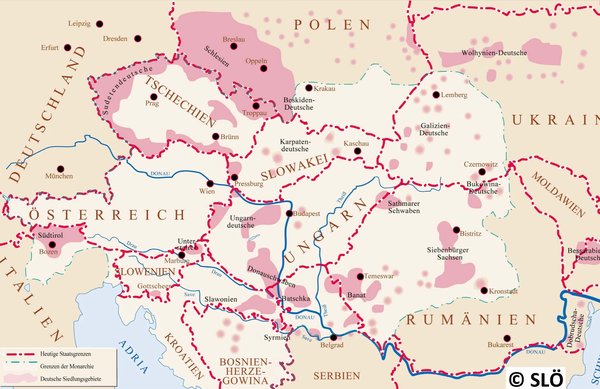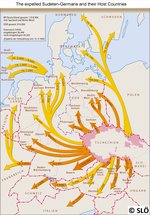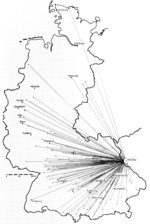After the collapse of the all fronts in spring 1945 the Sudeten-Germans were also run away from their ancestral homeland. Due to the Conference of Potsdam the banishment of the Germans from Bohemia and Silesia should take place in well-regulated ways. Yet in the first month the turnout was accomplished unsystematically and haply. Much later people were treated in a more human manner, as even the Czechs were surprised by the extent of the unthinkable misery and the large hardship. Many women with their crying children, old mothers and weak old men stood on the roads and did not know where to go. The men were killed in war or were in imprisonment. They could not assist their wives. The uncertainty about the husband’s doom reduced some women to despair. By night each German became homeless and unpropertied. Who entitled the allied forces to decide in this way? Neither employee, farmer, craftsman nor worker, everyone was driven out, because he was German. For many centuries the ancestors had lived and worked here. With a daypack on the back or with some luggage, which was even taken away, he had to leave his home. And some Germans did not get over the expulsion, as a consequence they committed suicide. When people were able to remain together in groups, one offered his assistance to others. So the doom became more bearable. It was worse for those, who had to go by foot many miles up to the Bavarian border. In many cases they died due to exhaustion in a ditch. Not to forget those fellow men, who were innocently heavily maltreated in camps. To everyone’s mind came the question, which crime he had committed. And some doubted God’s justice. The flow of the refugees ran into three large directions: In the north, into the states Saxony and Thuringia, in the south to Austria and in the west to the Free State of Bavaria.
The people of Hostau were evacuated from May to August 1946 in four deportations. One day one got the order by the "Narodni vybor" (national committee) to hold oneself ready by the next morning with luggage in a weight of 110 pounds and some hand baggage or a daypack. The luggage was fetched by carts and was unloaded in the yard of the Hotel Tichy during the first two transportations. The persons who were expelled had to stay with their luggage. Footlockers and suitcases were weighed. Some luggage items were confiscated by Czechs on duty. Money, savings books or other articles of value had to be handed in. During the last transportation everything was driven into the former labor camp. Luggage control did no longer exist. After different formalities people and luggage were loaded on trucks and driven to Holleischen. On the road behind the village of Schüttarschen, probably some looked back to the steeple of Hostau saying goodbye. Many hoped to return, in order not to leave the homeland completely hopeless. All displaced persons of the whole district of Bischofteinitz were merged together in a camp of barracks in Holleischen. Transportations of 1500 people each were arranged. The people stayed in the camp some days, which was exhausting for older ones and patients particularly. The “evacuation money” was disbursed in the camp. During the first transportation each person received 1,000 Reichsmark, in the last deportations it was only 500 Reichsmark. Under control of Czech soldiers everything, human beings and luggage, was shipped in freight cars on the railroads. And the “trip” went to Furth in Bavaria.
All transit camps on the boarder had to cope with inconceivable enormous tasks. Bavaria had to do the most work and the City of Furth offered help for all inhabitants of the District of Bischofteinitz, which will never be forgotten. The camp barrack was not finished yet, when the first mass transport of 40 freight cars with displaced people and their few belongings arrived. Afterward the doctor and two nurses of the camp examined the patients. If necessary they were admitted to the sick bed or to the urban hospital. The other family members were held in the camp so long. The oldest person of each car guided its people in the mandatory order to the investigation departments in the camp, to the washing plant, to the registration department, to the weighing machine and to delousing. After that all went back to the freight car, where they received a warm meal. Then the train went on, accompanied by a doctor and two nurses. From there the various trains were directed into the different states of the American zone of occupation. Unless, however, people had found new housing again, troublesome weeks of bunking out in schools, and hotel halls had to be passed.


